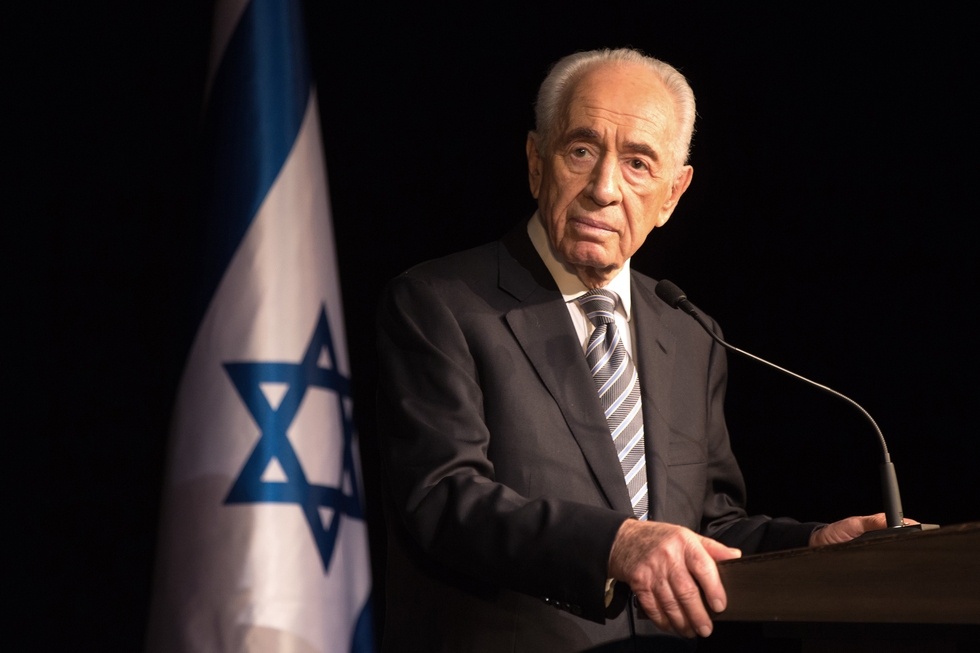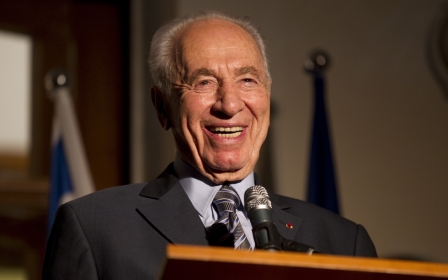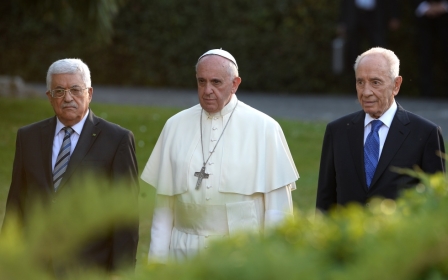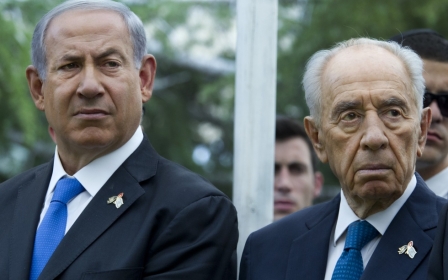Shimon Peres: Founder of Israel, architect of the occupation

Shimon Peres, the last of Israel’s founding fathers, died on Wednesday at the age of 93 after his condition swiftly deteriorated following a major stroke two weeks ago.
World leaders have lavished praise on Peres, including former American President Bill Clinton, who described him as a “dove of peace” for his role in the 1993 Oslo accords - the first agreements between Israeli and Palestinian leaders which led to him jointly winning a Nobel Peace Prize a year later.
However, the praise has not been universal, with critics drawing attention to his role in the development of Israel's early settlements and as prime minister in 1996 when Israeli troops massacred 106 Lebanese civilians in the so-called Operation Grapes of Wrath.
Palestinian Prime Minister Mahmoud Abbas, of the West Bank Fatah party, hailed Peres as "brave," while his Gaza-based rivals in Hamas called him a "criminal".
Born Szymon Perski in 1923, Peres moved with his family from his birthland of Poland to what was then British mandate Palestine in 1934, aged 11 years old. After being brought up in a kibbutz Peres met fellow Pole and subsequent close political ally David Ben-Gurion, who would go on to become Israel’s first prime minister.
Peres has long been lauded as a man who dedicated his life to finding peace between Israelis and Palestinians, refusing to give up on striking a deal as he entered his tenth and final decade.
Whilst giving a speech in 2014 at a memorial for Yitzhak Rabin - the former Israeli prime minister who was assassinated in 1995 for signing the Oslo accords - Peres urged people never to give up on peace.
“Peace has become a derogatory term,” he told thousands of people who had gathered in Tel Aviv. “There are those who say that those who believe in peace are naive, not patriots, delusional. But I say to all those in a clear voice, those who give up on peace are the ones who are delusional.”
Peres’ poetic way with words often captured headlines, winning him an image of being a voice of reason in a seemingly intractable conflict. However; during his long life in public office Peres’ legacy was forged through his involvement in decisions and projects far from the glare of television cameras.
Before Israel was established at the expense of Palestine in 1948, Peres was a member of the Haganah - an underground Jewish army - and despite being in his 20s he was appointed to the key role of acquiring weapons and ammunitions to be used in a war that ultimately led to the mass killing and expulsion of more than 700,000 Palestinians.
Israel's bomb
After excelling in his Haganah role he was appointed director general of Israel’s Defence Ministry in 1953, where he would go on to play a critical role in developing a secret nuclear reactor in the desert city of Dimona in the southern Negev Desert.
Although he would eventually serve as Israel’s ninth president, as well as twice being prime minister, his role in developing Israel's nuclear weapons, which were first tested in the 1960s, enshrined Israel as a major military power beyond the reach of any international accountability.
Later, as defence minister in 1975, Peres met with the apartheid government of South Africa and offered to sell them nuclear warheads. A man who was keen to keep his nuclear activities under wraps, Peres in 1986 authorised the Israeli secret service’s pursuit and abduction of whistle-blower Mordechai Vanunu, who would go on to serve 18 years in prison.
Settlement mastermind
Peres would eventually come to be viewed as a national treasure not only in Israel, but internationally as well, but he played a crucial role in the development of illegal Jewish Israeli settlements in Palestinian West Bank land, famously using the slogan “Settlements Everywhere” when he was defence minister in the 1970s.
His role in expanding Israeli control over Palestinian land would continue with the Oslo Accords, because, despite them being lauded as a step toward peace, the splitting of the West Bank into three areas ultimately provided the basis for Israeli control over much of what was supposed to be a Palestinian state.
The accords led to the West Bank being split into three areas - A, B, and C - and were only supposed to last five years. But these areas continue to be the basis on how the West Bank is governed, with Area C - under full Israeli control - making up 62 percent of the total West Bank.
Qana massacre
For many critics Peres will also be remembered for his role in the killing of 106 Lebanese civilians in an attack on a village during Israel’s 1996 military operation against Hezbollah known as Operation Grapes of Wrath.
Peres was Israel’s prime minister when his army attacked the village of Qana on 18 April 1996, shelling a United Nations building where some 800 civilians were sheltered amid the Israeli bombardment.
When questioned about the Qana attack - which he defended as a mistake - Peres later said: “Everything was done according to clear logic and in a responsible way. I am at peace.”
It is this alternative narrative of Peres’ life and legacy which means he will not be eulogised by Palestinians and many others.
Arab reaction
While English language media led with the image of Peres as a dove of peace, Arabic outlets took a different track when covering news of his death on Wednesday.
Sky News Arabic described Peres as the “godfather” of Israel’s nuclear weapons programme and the “founder of settlements”. Al Jazeera Arabic labelled him a “mass murderer” who was “crowned with the Nobel Prize”.
The leadership of the Palestinian Authority - which Peres helped create - was more complimentary about the late Israeli leader, with a key advisor to President Mahmoud Abbas describing him as a “man of peace”.
“His passing is certainly a great loss for humanity and the region,” Majdi al-Kahlidi, diplomatic advisor to Abbas, told the Jerusalem Post.
However, Awni Almashni, a member of Abbas’ Fatah Party, told MEE Peres was “an enemy of the Palestinian people”.
“Peres believed in peace but in the Israeli way that gives Israel power and strength over the land,” he said. “We don’t see him as a peacemaker.”
The Gaza-based Hamas movement, fierce rival of Abbas, described Peres as a “criminal” who they were “very happy” was dead.
Hamas spokesperson Sami Abu Zuhri told the Associated Press: “Shimon Peres was the last remaining Israeli official who founded the occupation, and his death is the end of a phase in the history of this occupation and the beginning of a new phase of weakness.”
Peres’ funeral will take place on Friday at the Israeli national cemetery on Mount Herzl in Jerusalem, with political leaders from around the globe expected to attend.
But one person who won’t be there is Israeli-Palestinian politician Basil Ghattas, who caused outrage in Israel when he responded to Peres’ stroke on 14 September by writing on Facebook that he wouldn’t be “rushing to participate” in a “festival of grief and loss”.
“Peres was one of the strongest pillars of the Zionist colonial settlement enterprise,” the Knesset member wrote. “One of the most ruthless and extreme and harmful to the Palestinian nation.
“Peres is covered in our blood from head to toe.”
When contacted by MEE on Wednesday Ghattas said he could not add anymore than what he had already said on Facebook.
Diana Buttu, a former Palestinian negotiator, told MEE the outpouring of praise for Peres undermined his actual life - and that his actions go beyond war crimes.
“It’s not enough to call Peres a war criminal because that lets him off the hook - he’s beyond that,” she said. “Peres set into place a whole series of war crimes by Israel that have taken place without accountability.
“What Peres should be remembered for is not just being a war criminal but making the word peace devoid of any real meaning. Peace can now mean ethnic cleansing, supporting settlement expansion, bombing a UN building, and getting a nuclear arsenal without undergoing any international inspections.
“Peace can mean flying in the face of international law - that’s what Peres should be remembered for.”
Palestinian Nabila Espanioly, a feminist activist from the Hadash Party, told MEE Peres was a "Zionist leader first and foremost".
“His legacy is one of massacres and discrimination," she said. "He took a step towards peace but he didn’t make any real change except to confiscate more and more Palestinian lands.”
Until his final days Peres stated his commitment to peace but he was always clear that the Jewish people were his priority in any potential settlement.
“The first priority is preserving Israel as a Jewish state,” he said in 2014. “That is our central goal, that is what we are fighting for.”
New MEE newsletter: Jerusalem Dispatch
Sign up to get the latest insights and analysis on Israel-Palestine, alongside Turkey Unpacked and other MEE newsletters
Middle East Eye delivers independent and unrivalled coverage and analysis of the Middle East, North Africa and beyond. To learn more about republishing this content and the associated fees, please fill out this form. More about MEE can be found here.




